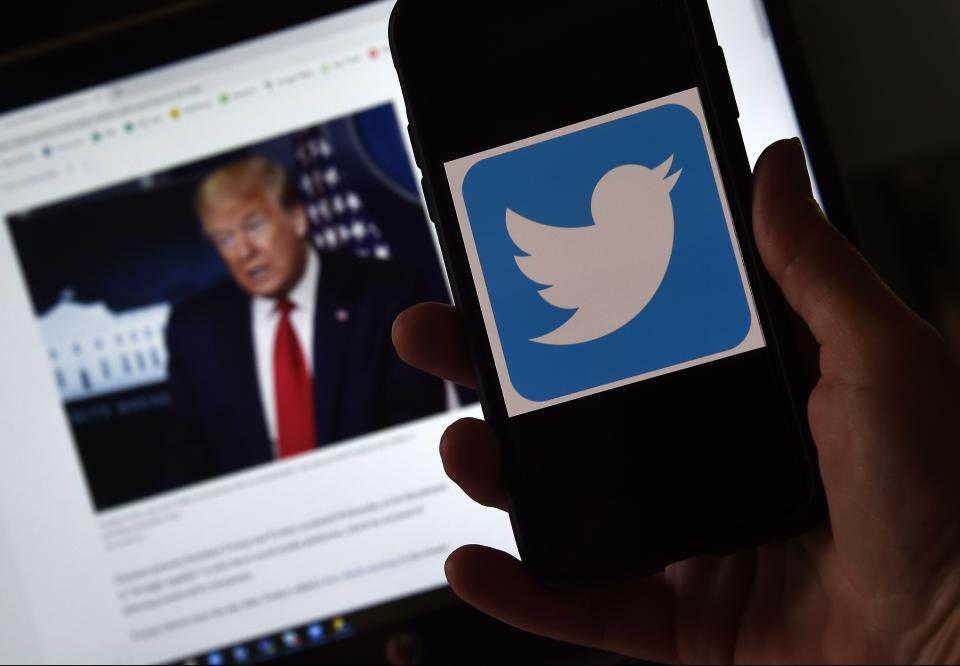Michigan GOP want to ban social media companies from removing politicians' accounts
A handful of Michigan Republican lawmakers support creating new regulations that would ban large, private social media platforms from removing the accounts of political candidates that violate their terms of service.
The measure comes about one year after Facebook and Twitter banned former President Donald Trump, suggesting some of his posts after the Jan. 6 attack on the U.S. Capitol could incite further violence.

It's unclear that the proposal is enforceable and it may be unconstitutional: A federal judge in Florida blocked the implementation of a similar bill in that state, saying it likely violated free speech protections enshrined in the First Amendment among other issues.
The Michigan bill would also establish new government restrictions on businesses, something conservatives frequently oppose.
More: Twitter locks Donald Trump's account for 12 hours, threatens permanent suspension
More: Jan. 6 attacks haven't proved a setback to Republicans. Here's why
But it will certainly garner attention and potentially some support among Republicans and Trump supporters frustrated that their favorite politicians may be banned from social media platforms after sharing information deemed inaccurate or dangerous by the companies.
State Rep. Beau LaFave, an Iron Mountain Republican and GOP candidate for Michigan secretary of state, is the bill's lead sponsor.
"It is un-American to shut down debate that you don't like, or speech that you don't like," LaFave said in a phone interview.
"We have a First Amendment in the United States to make sure that all ideas are debated, and the best ideas at the end of the day win. When you're shutting down one side of the ideological coin, we have a real problem."
LaFave is joined by state Rep. Matt Maddock, a Milford Republican and husband of Michigan GOP party co-chair Meshawn Maddock, and a cadre of other Trump-supporting Republicans in championing the measure.
They're calling the bill the "justice-abolishing, corporate-kneecapping act," or the JACK act, an apparent swipe at former Twitter CEO Jack Dorsey.
The Michigan bill would ban social media companies with more than 1,000 employees from "deplatforming" — defined as temporarily or permanently removing an account or profile — someone who is a politician or candidate. That person would need to qualify as a political candidate under Michigan election law.
If a company did deplatform a candidate, that person could file a civil lawsuit and potentially win $10,000 for every day the candidate was banned from the social media site.
The bill would ban any deplatforming, for any reason. LaFave said he would support removing someone trying to incite violence, though.
"The bill isn't about Donald Trump. He's a big boy; he'll be fine," LaFave said.
"This is about protecting the little guy in local school board elections."
The measure is up for discussion Wednesday in the House Communications and Technology Committee. A spokesman for House Speaker Jason Wentworth, R-Farwell, did not say whether the chamber leader supports the measure.
"He is going to let the committee do its work and vet the proposal before weighing in, " said Gideon D'Assandro.
More: Draft Trump order suggested seizing voting machines based on Antrim irregularities
More: GOP candidates for Michigan governor jockey for endorsement from former President Trump
Last year, Florida Gov. Ron DeSantis signed a similar bill into law. That measure allowed the Florida election commission to fine social media companies up to $250,000 a day for deplatforming candidates for statewide office.
Several private companies sued the state, challenging the constitutionality of the law. U.S. District Judge Robert Hinkle agreed with their arguments, issuing a preliminary injunction in June 2021 that blocked the law from taking effect.
"The legislation compels providers to host speech that violates their standards — speech they otherwise would not host — and forbids providers from speaking as they otherwise would," Hinkle wrote.
"Whatever else may be said of the providers’ actions, they do not violate the First Amendment. ... Like prior First Amendment restrictions, this is an instance of burning the house to roast a pig."
The state of Florida appealed that ruling to the 11th Circuit Court of Appeals. That case is still pending, but the law is not in effect.
Contact Dave Boucher: dboucher@freepress.com or 313-938-4591. Follow him on Twitter @Dave_Boucher1.
This article originally appeared on Detroit Free Press: Michigan GOP bill: Ban social media from removing politician accounts

